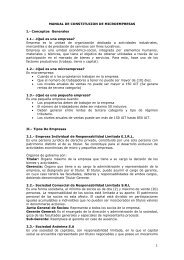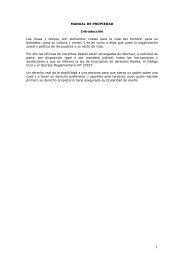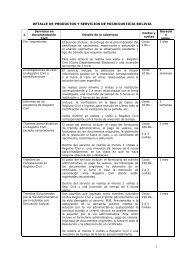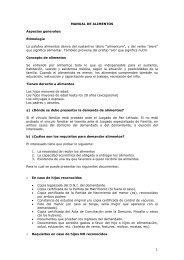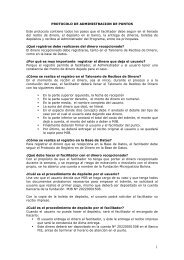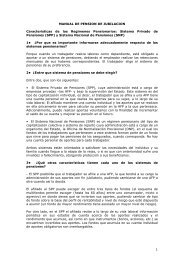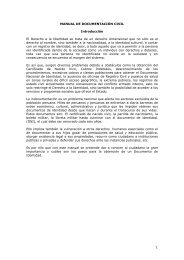ICISS report - International Coalition for the Responsibility to Protect
ICISS report - International Coalition for the Responsibility to Protect
ICISS report - International Coalition for the Responsibility to Protect
Create successful ePaper yourself
Turn your PDF publications into a flip-book with our unique Google optimized e-Paper software.
The <strong>Responsibility</strong> <strong>to</strong> <strong>Protect</strong> 41<br />
populations, regardless of origin, once entry occurs. There can be no such thing as “guilty<br />
minorities” in <strong>the</strong> post-intervention phase. Everyone is entitled <strong>to</strong> basic protection <strong>for</strong> <strong>the</strong>ir<br />
lives and property.<br />
5.9 One of <strong>the</strong> most difficult and important issues <strong>to</strong> be regularly confronted in <strong>the</strong> postintervention<br />
phase relates <strong>to</strong> <strong>the</strong> disarmament, demobilization and reintegration of local<br />
security <strong>for</strong>ces. Reintegration will usually take <strong>the</strong> longest time <strong>to</strong> achieve, but <strong>the</strong> whole<br />
process cannot be judged <strong>to</strong> have been successful until it is complete. It is also a necessary<br />
element of returning a country <strong>to</strong> law and order since a demobilized soldier, unless properly<br />
reintegrated in<strong>to</strong> society, with sustainable income, will probably turn <strong>to</strong> armed crime or<br />
armed political opposition. Successful disarmament of personnel from military and security<br />
<strong>for</strong>ces, and o<strong>the</strong>r ef<strong>for</strong>ts <strong>to</strong> collect small arms and curb <strong>the</strong> entry of new ones, will be an<br />
important element of this ef<strong>for</strong>t.<br />
5.10 Ano<strong>the</strong>r element of <strong>the</strong> same problem is <strong>the</strong> rebuilding of new national armed <strong>for</strong>ces<br />
and police, integrating as far as possible elements of <strong>the</strong> <strong>for</strong>merly competing armed factions<br />
or military <strong>for</strong>ces. This process will be vital <strong>to</strong> national reconciliation and protection of <strong>the</strong><br />
re-established state once <strong>the</strong> intervening <strong>for</strong>ces leave. However, all <strong>to</strong>o often in <strong>the</strong> past, in<br />
Cambodia and elsewhere, it has proved <strong>to</strong> be <strong>to</strong>o long-term <strong>for</strong> <strong>the</strong> intervening authorities,<br />
and <strong>to</strong>o expensive and sensitive <strong>for</strong> international donors who wish <strong>to</strong> avoid later accusations<br />
of re-arming <strong>for</strong>mer enemies.<br />
5.11 Complaints are regularly heard from military officers around <strong>the</strong> world that in interventions<br />
and <strong>the</strong>ir aftermath <strong>the</strong>y are all <strong>to</strong>o often given functions <strong>for</strong> which <strong>the</strong>y are not<br />
trained and which are more appropriate <strong>to</strong> police. The simple answer is that civilian police<br />
are really only able <strong>to</strong> operate in countries where functioning systems of law and courts exist.<br />
Although <strong>the</strong> presence of some police in any military operation may be necessary from <strong>the</strong><br />
start, including <strong>for</strong> <strong>the</strong> purpose of training local police, <strong>the</strong>re is probably little alternative <strong>to</strong><br />
<strong>the</strong> current practice of deploying largely military <strong>for</strong>ces at <strong>the</strong> start, but as conditions improve<br />
and governmental institutions are rebuilt, phasing in a civilian police presence.<br />
5.12 An essential part of pre-intervention planning has been identified by both political<br />
and military personnel as being an exit strategy (not <strong>the</strong> same thing as an exit timetable) <strong>for</strong><br />
intervening troops. There is <strong>for</strong>ce in <strong>the</strong> argument that without such a strategy <strong>the</strong>re are<br />
serious risks in mounting any military intervention at all, as an unplanned, let alone<br />
precipitate, exit could have disastrous, or at best unsettling, implications <strong>for</strong> <strong>the</strong> country, and<br />
could also serve <strong>to</strong> discredit even <strong>the</strong> positive aspects of <strong>the</strong> intervention itself.<br />
Justice and Reconciliation<br />
5.13 In many cases <strong>the</strong> country in which a military intervention takes place may never have<br />
enjoyed a non-corrupt or properly functioning judicial system, including both <strong>the</strong> courts and<br />
police, or this may have deteriorated or disappeared as <strong>the</strong> state itself began <strong>to</strong> fail.<br />
Increasingly, and particularly from <strong>the</strong> time of <strong>the</strong> UN Transitional Authority in Cambodia<br />
(UNTAC) in <strong>the</strong> early 1990s, <strong>the</strong>re has been a realization in UN circles and elsewhere about<br />
<strong>the</strong> importance of making transitional arrangements <strong>for</strong> justice during an operation, and<br />
res<strong>to</strong>ring judicial systems as soon as possible <strong>the</strong>reafter. The point is simply that if an intervening<br />
<strong>for</strong>ce has a mandate <strong>to</strong> guard against fur<strong>the</strong>r human rights violations, but <strong>the</strong>re is no<br />
functioning system <strong>to</strong> bring viola<strong>to</strong>rs <strong>to</strong> justice, <strong>the</strong>n not only is <strong>the</strong> <strong>for</strong>ce’s mandate <strong>to</strong> that<br />
extent unachievable, but its whole operation is likely <strong>to</strong> have diminished credibility both<br />
locally and internationally.



